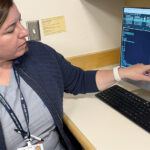Gearing up for sports? Call your child’s pediatrician

Every year, young athletes are required to get sports physicals, clearing them for participation in organized athletics. But, did you know that these physicals should be done by your child’s primary care provider (PCP)? Sports physical examinations give clearance for children to participate in the sports season safely and are a crucial part of pediatrics. Pediatric Associates of Southern Westchester’s Dr. Lisa Mandelker says, “Sports physicals allow the provider to assess conditions that could be dangerous or cause injury if not found in advance.” In recent years, it has become more common to go to an urgent care location or a walk-in clinic to get a sports physical. However, these examinations are not as comprehensive as one from your primary care provider During COVID-19, it is more important than ever to make appointment with your trusted provider.
Dr. Heather Davidson of Heather O. Davidson, MD adds, “During a sports physical, we are able to check heart rhythms, blood pressure, and other vitals. We are also able to monitor development and other key screenings, if this is the child only visit to the pediatrician for the year. So, these sports physicals are of huge value to your child’s health.”
Why should you see your PCP for your child’s sports physical? Experts from the Boston Children’s Primary Care Alliance and Boston Children’s Health Physicians explain all that goes into a sports physical with a primary care physician:
- Review physical well-being. Your PCP will assess common conditions associated with sports, including asthma, chest pains, or past injuries that could raise potential concerns for sports.
- Medication review. Your PCP will update your child’s prescriptions, manage dosages, and advise about potential side effects.
- Allergy review. Have your child’s seasonal allergies worsened? Have they developed new allergies? These questions can be addressed during your child’s physical.
- Ensure immunizations are up-to-date. It may be time for a new vaccine, booster shot, or the flu shot.
- Developmental screening. Your pediatrician will check on expected growth, motor skills, and other developmental milestones. Your child can ask questions like “when can I expect puberty?” and “when will I be finished growing?”
- Mental and behavioral health screening. Your child’s PCP will assess and monitor cognitive, social, and emotional health.
- Guidance on disease risk. Your child’s doctor will check in and educate about substance abuse, which is especially important in middle- and high-schoolers.
Your PCP knows you and your child best. Dr. Mandelker explains that “having full knowledge of the athlete’s history can better guide them safely through the upcoming sports season.” Contacting your child’s PCP before starting an intense sports season ensures your child is not only ready to play, but also ready for the whole year. This is your and your child’s opportunity to ask your pediatrician questions, so be sure to take advantage of it.
Learn more about Boston Children’s Primary Care Alliance.
Related Posts :
-

3D imaging could become standard practice in orthopedics. Here’s how.
It took a trained eye to see the abnormality on the patient’s X-ray. There, hidden behind the acetabulum was ...
-

Ask a sports medicine specialist: Why are ACL tears so common among female athletes?
When an athlete is sprinting after an opponent who suddenly stops or changes direction, their anterior cruciate ligaments (ACLs) make ...
-

Which pain medication is right for your child? What a pediatrician wants parents to know
There’s no shortage of safe and effective pain medications for children. Acetaminophen (commonly known as Tylenol), ibuprofen (Motrin, Advil), ...
-

Jackie’s dreams of playing professional soccer back on track after ACL surgery
From her dorm in Newcastle, England, Jackie Zapata can hear fans roaring in the soccer stadium a few blocks away. ...





